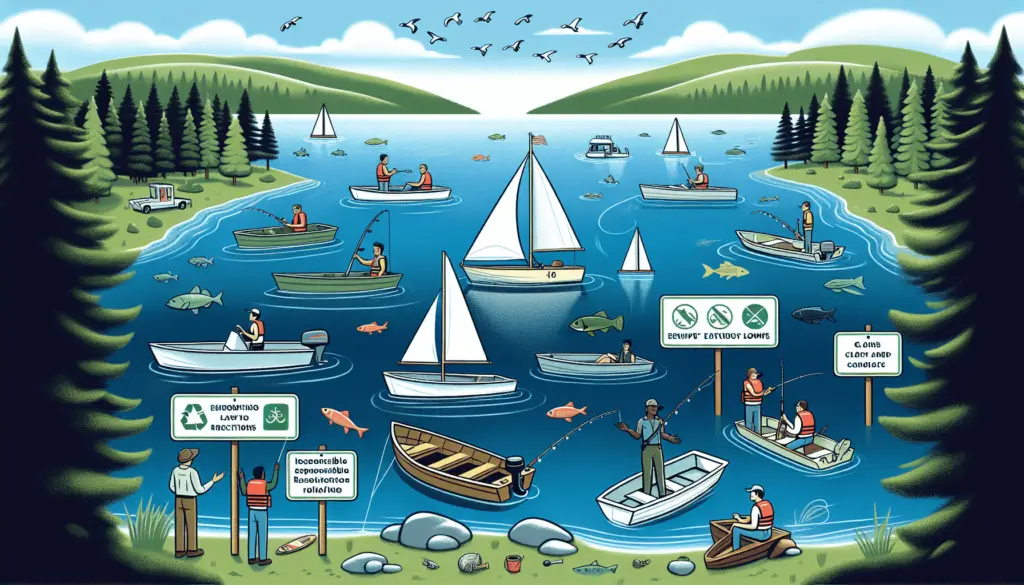Imagine tracing your fingers on a map of your favorite lake or coastal retreat, the cool rush of wind in your hair and the sound of waves lapping against the boat. In “How to Navigate Boating Regulations in Your Area,” you will embark on a transformative journey that helps you become a master of maritime laws. As you learn to decode each rule, life on the water will not only become safer but also more fulfilling, serene, and unmarred by regulatory confusion. Thi extraordinary piece is the chart that will guide you to navigate the waters of boating regulations effortlessly.

Understanding the Importance of Boating Regulations
Boating is an exciting recreational activity enjoyed by many people, yet behaving irresponsibly can pose dangerous risks to you and those around you. Therein lies the role of boating regulations; a particular set of rules and guidelines to ensure your own safety and the safety of others.
The role of boating regulations in promoting safety
Put simply, boating regulations act as a safety net. They cover nearly all aspects of boating, from the design and construction of a boat to its operation and necessary safety equipment. By adhering to these rules, you can drastically reduce the risk of accidents or unfortunate incidents that may lead to injury.
Effects of disobeying boating regulations
Disobeying boating regulations can be disastrous. If you choose to ignore these guidelines, you’re jeopardizing your safety along with others. Abiding by the regulations not only ensures that boating remains fun and enjoyable but also helps you avoid potential penalties like fines, or even, imprisonment.
Responsibility of boat owners in following regulations
As a boat owner, it’s your duty to not only follow these regulations but to ensure that anyone operating your boat is aware of and complies with them. Your proactive attitude towards safety can set you apart as a responsible boater and can potentially save lives.
Identifying the Governing Bodies for Boating Regulations
Understanding boating regulations requires knowing the bodies which enforce and govern them. These bodies differ depending on the location but are primarily focused on enforcing safety.
National bodies
At the national level, there often exists a maritime authority responsible for drafting and implementing boating regulations. This entity ensures boating laws are uniformly enforced throughout the country.
Local maritime authorities
Local maritime authorities often act as the enforcement arm for boating regulations. They undertake regular checks and inspections ensuring compliance with the rules. They’re also the ones you’ll be dealing with should you breach any rules or regulations.
Role of different organizations in boating laws and regulations
Other organizations, including non-profit groups, may also play a part in promoting and ensuring adherence to boating regulations. Their work often includes education, awareness, and occasionally, lobbying for more stringent regulations to further enhance safety on the water.
Process of Learning About Your Local Boating Regulations
Researching online
The most accessible way to learn about your local boating regulations is through careful online research. National and local maritime websites are rich with information, so it’s just a matter of dedicating some time to sift through them.
Contacting local maritime authorities
Local maritime authorities are a treasure trove of useful information. They can provide details regarding specific rules and regulations in your area, and answer any questions you might have.
Participating in boat education courses
Engaging in boat education courses can be invaluable. Well-designed courses can provide a comprehensive understanding of regulatory nuances and practical application.
Understanding the Key Elements of Boating Regulations
Safety equipment requirements
Boating regulations often establish mandatory safety equipment requirements. This may include life jackets, fire extinguishers, flare guns, and other emergency supplies.
Boating speed limits
Just like on land, the sea has speed limits too. Being wary of your boat’s speed helps maintain a safe environment for every boater around.
Alcohol and boating
Alcohol and boating don’t mix. There are strict limits on blood alcohol content while operating a boat to mitigate risks associated with impaired judgement or slow reflexes.
Environmental regulations (waste disposal, wildlife, etc.)
Environmental regulations help preserve the aquatic ecosystem. Regulations might pertain to the proper waste disposal, interaction with wildlife, or limiting access to protected marine areas.

Importance of Boat Registration and Licensing
Boat registration and licensing are integral parts of boating regulations. The registration process allows authorities to keep track of every operational boat.
Process of boat registration
The process of boat registration varies by location but typically requires the submission of particular documents. Contact your local maritime authority to understand the specifics.
Renewal and expiry of boat licences
Similar to a vehicle license, a boat license must be renewed periodically. Your license’s expiry date is important, and you can face penalties if you let it lapse.
Penalties for failing to license or register boat
The penalties for failing to license or register your boat can be severe, ranging from hefty fines to impounding of your boat. Stay on top of your documentation to avoid these complications.
Learning About Local Boating Zones and Restrictions
Understanding local boating zones and restrictions is critical to safely and lawfully enjoying the water.
Knowledge of protected waters
Protected waters might restrict or prohibit boating activities to safeguard aquatic life. Be sure to research thoroughly before venturing into unfamiliar waters.
Boating speed restrictions zones
Certain zones may have stricter speed restrictions due to increased boat traffic or the presence of marine wildlife. Abide by these limits to maintain safety and prevent unnecessary disturbances to marine life.
Restricted boating areas due to environmental or safety reasons
Some areas might be off-limits due to safety concerns or environmental sensitivity. Disregarding these restrictions can not only risk hefty penalties but endanger lives and the environment.
Navigational Rules in Boating
Just like roads have traffic rules, the waters have navigational rules. Understanding them can prove essential for safe and effective operation of your boat.
Rights of way on the water
Rights of way in boating can often seem complex, but they essentially boil down to understanding which boat has to yield to another. It’s a crucial element in avoiding water collisions.
Boat traffic rules
Boat traffic rules depend on where and when you’re boating. These rules may regulate things like boat speed, direction, and where you can anchor.
Use of navigation lights and signals
Navigation lights and signals are vital for communicating your intentions to other boaters, especially during night or low-visibility conditions. Following appropriate guidelines can prevent accidents.
Role of Boating Insurance
Boating insurance can provide a safety net in case of unexpected circumstances. Depending on your locality, it might also be a legal requirement.
Insurance requirement by law
In some areas, you are required by law to carry boating insurance. This policy can provide vital financial coverage in case of an accident, theft, or damage.
Coverage benefits of boating insurance
The benefits of having a boating insurance policy extend beyond legal requirements. It provides financial coverage for loss or damage to your boat and can also protect you from liability if your boat causes damage or injury to others.
Working with insurance companies
An understanding of your policy details and a good relationship with your insurance provider can help you navigate the insurance process smoothly. Coverage specifics, claims procedures, and cost should be thoroughly understood.
Handling Legal Issues and Violations in Boating
Boating laws exist to ensure safety, but if broken, can lead to serious legal consequences.
Common boating offenses and their legal implications
Common offenses range from operating a boat under the influence, speeding, or navigating in restricted waters. Penalties can range from fines to criminal charges, and ultimately, loss of boating privileges.
Legal process in case of boating violations
If you find yourself facing a boating violation, the process usually involves an initial citation, potential court appearance, and resolution in the form of fines, counseling, or even jail time, depending on the severity of the offense.
How to handle boat inspection
Boat inspections are a routine part of boating. Remaining calm, co-operating fully with the authorities, and ensuring your documentation is in order can help the process go smoothly.
Continuing Education on Boating Regulations
Boating laws often evolve, and it’s crucial to stay up-to-date with the latest regulations.
Importance of staying updated with changing regulations
As regulations can frequently change or be updated, it’s important as a responsible boater to stay informed. Ignorance of the law is seldom an excuse in the regulator’s eyes.
Resource for ongoing boating regulation education
Local maritime authority websites, boating courses, and community-based resources are great ways to keep up with the latest boating regulatory changes.
Participation in local boating community for updates and support
Being a part of a local boating community can be incredibly beneficial. They provide a great source of mutual support and information for all things boating, including regulatory updates.
By thoroughly understanding and adhering to boating regulations, you are committing to your safety and the safety of others. So embrace these guidelines, keep learning, and enjoy every moment out there on the water!

